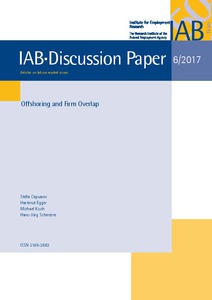Offshoring and firm overlap
"We set up a model of offshoring with heterogeneous producers that captures two empirical regularities of German offshoring firms. There is selection of larger, more productive firms into offshoring. However, the selection is not sharp, and offshoring and non-offshoring firms coexist over a wid...
| Main Authors: | , , |
|---|---|
| Institution: | ETUI-European Trade Union Institute |
| Format: | TEXT |
| Language: | English |
| Published: |
Nürnberg
2017
IAB |
| Subjects: | |
| Online Access: | https://www.labourline.org/KENTIKA-19135132124919533149-offshoring-and-firm-overlap.htm |
| Summary: | "We set up a model of offshoring with heterogeneous producers that captures two empirical regularities of German offshoring firms. There is selection of larger, more productive firms into offshoring. However, the selection is not sharp, and offshoring and non-offshoring firms coexist over a wide range of the revenue distribution. An overlap of offshoring and nonoffshoring firms emerges in our model because, in contrast to textbook models of trade with heterogeneous producers, we allow firms to differ in two technology parameters thereby decoupling the offshoring status of a firm from its revenues. In an empirical analysis, we employ firm-level data from Germany to estimate key parameters of the model and show that ignoring the overlap lowers the estimated gains from offshoring by more than 50 percent and, at the same time, exaggerates substantially the importance of the extensive margin for explaining the evolution of German offshoring over the last 25 years." |
|---|---|
| Physical Description: | 57 p. Digital |

